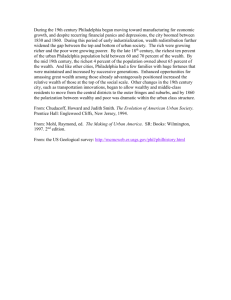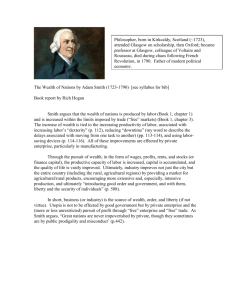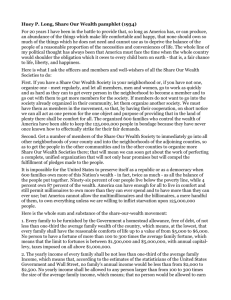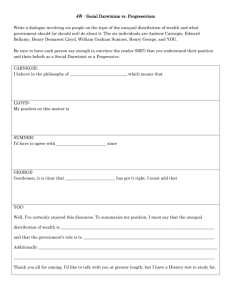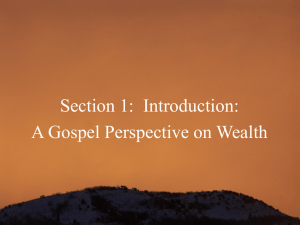Wealth Against Commonwealth by Henry Demarest Lloyd
advertisement
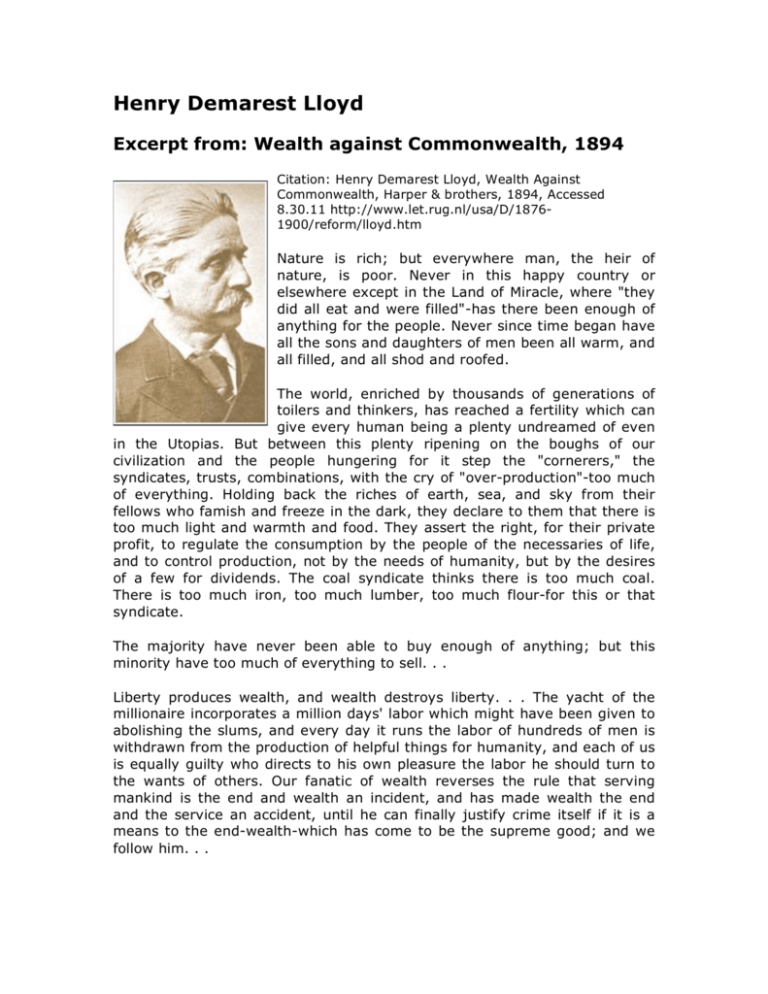
Henry Demarest Lloyd Excerpt from: Wealth against Commonwealth, 1894 Citation: Henry Demarest Lloyd, Wealth Against Commonwealth, Harper & brothers, 1894, Accessed 8.30.11 http://www.let.rug.nl/usa/D/18761900/reform/lloyd.htm Nature is rich; but everywhere man, the heir of nature, is poor. Never in this happy country or elsewhere except in the Land of Miracle, where "they did all eat and were filled"-has there been enough of anything for the people. Never since time began have all the sons and daughters of men been all warm, and all filled, and all shod and roofed. The world, enriched by thousands of generations of toilers and thinkers, has reached a fertility which can give every human being a plenty undreamed of even in the Utopias. But between this plenty ripening on the boughs of our civilization and the people hungering for it step the "cornerers," the syndicates, trusts, combinations, with the cry of "over-production"-too much of everything. Holding back the riches of earth, sea, and sky from their fellows who famish and freeze in the dark, they declare to them that there is too much light and warmth and food. They assert the right, for their private profit, to regulate the consumption by the people of the necessaries of life, and to control production, not by the needs of humanity, but by the desires of a few for dividends. The coal syndicate thinks there is too much coal. There is too much iron, too much lumber, too much flour-for this or that syndicate. The majority have never been able to buy enough of anything; but this minority have too much of everything to sell. . . Liberty produces wealth, and wealth destroys liberty. . . The yacht of the millionaire incorporates a million days' labor which might have been given to abolishing the slums, and every day it runs the labor of hundreds of men is withdrawn from the production of helpful things for humanity, and each of us is equally guilty who directs to his own pleasure the labor he should turn to the wants of others. Our fanatic of wealth reverses the rule that serving mankind is the end and wealth an incident, and has made wealth the end and the service an accident, until he can finally justify crime itself if it is a means to the end-wealth-which has come to be the supreme good; and we follow him. . . In an incredible number of the necessaries and luxuries of life, from meat to tombstones, some inner circle of the "fittest" has sought, and very often obtained, the sweet power which Judge Barrett found the sugar trust had: It "can close every refinery at will, close some and open others, limit the purchases of raw material (thus jeopardizing, and in a considerable degree controlling, its production), artificially limit the production of refined sugar, enhance the price to enrich themselves and their associates at the public expense, and depress the price when necessary to crush out and impoverish a foolhardy rival." . Laws against these combinations have been passed by Congress and by many of the States. There have been prosecutions under them by the State and Federal governments. The laws and the lawsuits have alike been futile. In a few cases names and form of organization have been changed, in consequence of legal pursuit. The whiskey, sugar, and oil trusts had to hang out new signs. But the thing itself, the will and the power to control markets, livelihoods, and liberties, and the toleration of this by the public-this remains unimpaired; in truth, facilitated by the greater secrecy and compactness which have been the only results of the appeal to law. . . What we call Monopoly is Business at the end of its journey. The concentration of wealth, the wiping out of the middle classes, are other names for it. To get it is, in the world of affairs, the chief end of man. . . If our civilization is destroyed, as Macaulay predicted, it will not be by his barbarians from below. Our barbarians come from above. Our great moneymakers have sprung in one generation into seats of power kings do not know. . . Two social energies have been in conflict, and the energy of reform has so far proved the weaker. We have chartered the self-interest of the individual as the rightful sovereign of conduct; we have taught that the scramble for profit is the best method of administering the riches of earth and the exchange of services. Only those can attack this system who attack its central principle, that strength gives the strong in the market the right to destroy his neighbor. Only as we have denied that right to the strong elsewhere have we made ourselves as civilized as we are. And we cannot make a change as long as our songs, customs, catchwords, and public opinions tell all to do the same thing if they can. Society, in each person of its multitudes, must recognize that the same principles of the interest of all being the rule of all, of the strong serving the weak, of the first being the last-"I am among you as one that serves -which have given us the home where the weakest is the one surest of his rights and of the fullest service of the strongest, and have given us the republic in which all join their labor that the poorest may be fed, the weakest defended, and all educated and prospered, must be applied where men associate in common toil as wherever they associate. Not until then can the forces be reversed which generate those obnoxious persons-our fittest.





